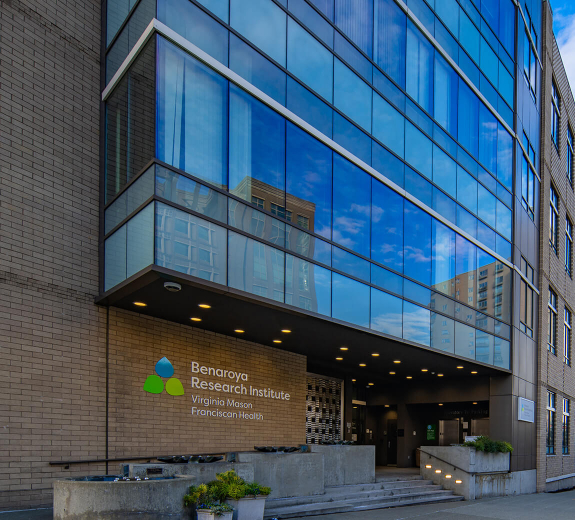A variation in the gene IFIH1 is a double-edged sword: It promotes autoimmune disease and protects against viruses
Researchers at Benaroya Research Institute at Virginia Mason (BRI) helped discover that a variation in the gene IFIH1 simultaneously increases the risk of autoimmune disease and helps protect against viruses. The research was published in the May 29, 2017, online edition of the journal Nature Immunology.
“Genetic studies showed that many people with T1D and systemic lupus have a specific variation, which is called IFIH1 A946T, but no one knew its exact role in promoting autoimmunity,” says BRI President Jane Buckner, MD, who contributed to the study. “Our research mapped out how the variation influences the immune system and contributes to disease.”
The immune system keeps people healthy by recognizing bacteria and viruses, and fighting them off. But it can also malfunction and attack the body. This triggers autoimmune diseases such as type 1 diabetes, lupus, multiple sclerosis and rheumatoid arthritis. One in 15 Americans suffers from an autoimmune disease.
For the Nature Immunology study, BRI researchers teamed up with researchers from Seattle Children’s Research Institute (SCRI), the University of Washington and University of Florida. The work is the result of a collaborative project funded by the National Institutes of Health (NIH) and led by Dr. Buckner at BRI and Dr. David Rawlings at SCRI. The team used model systems and blood cells donated by healthy people to study the IFIH1 variation linked with autoimmunity. More specifically, they chronicled how the variation affects the proteins and signals that tell the immune system how to function.
The researchers found that the IFIH1 variation enhances how the immune system responds to certain viruses, making it more likely the body will defeat them.
“This helps explain why so many people have this variation, including about 50 percent of people of European descent,” Buckner says. “It was favored by natural selection because it helped protect against illness.”
But this protection comes with a price. The researchers also showed that the IFIH1 variation makes the immune system more likely to mistake the body’s own cells as foreign invaders. This kicks off autoimmune attacks that are the hallmarks of type1 diabetes, lupus and other autoimmune diseases.
“The IFIH1 variation increases the chances that the immune system will turn against the body, even when it isn’t reacting to a virus,” Buckner says.
The study marks another step in BRI’s quest to understand autoimmune diseases to find better treatments, and ultimately to prevent and cure them.
“Autoimmune diseases are caused by a complicated mix of factors including genes and the things people are exposed to in the environment,” Buckner says. “Every time we make a discovery like this, it brings us closer to pinpointing how these factors work together, and to finding treatments that stop or prevent these diseases.”



